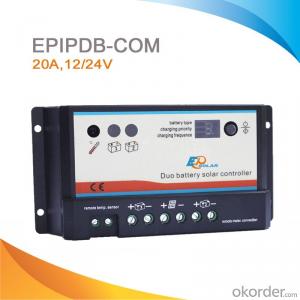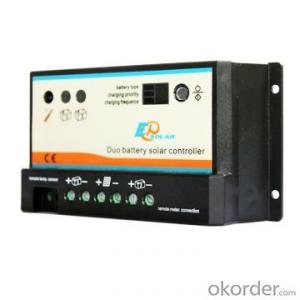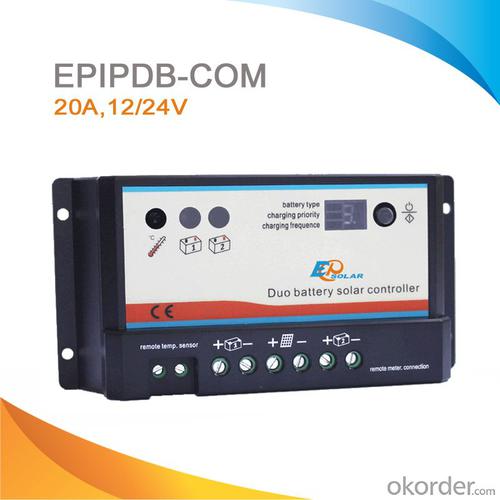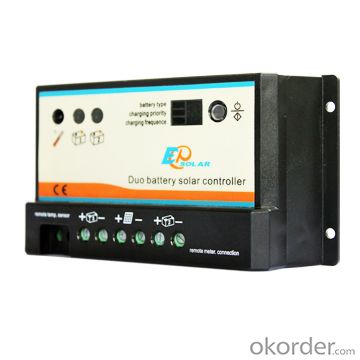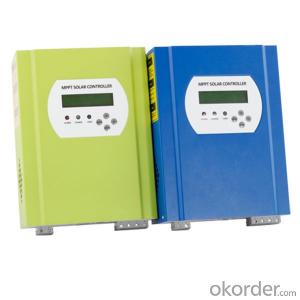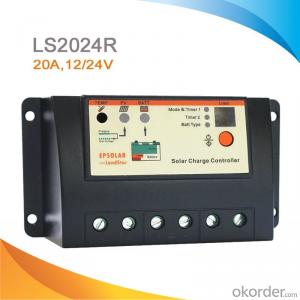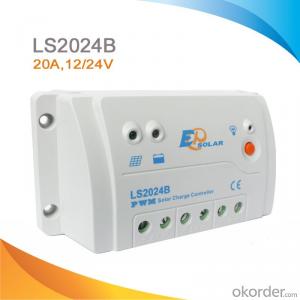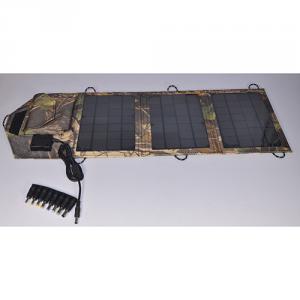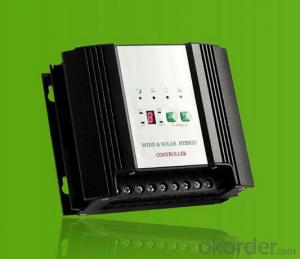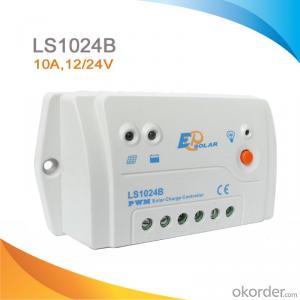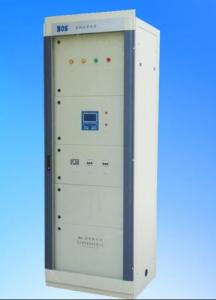Solar Controllers for Sale - Duo Battery Charge Controller Solar for Caravan, Motorhome, Boat and Golf Cart, 20A, 12/24V, EPIPDB-COM
- Loading Port:
- Tianjin
- Payment Terms:
- TT or LC
- Min Order Qty:
- 30 pc
- Supply Capability:
- 1000 pc/month
OKorder Service Pledge
OKorder Financial Service
You Might Also Like
EPIPDB-COM series solar controller can charge two battery banks. No load terminals
Features:
·Two battery charging eliminates the extra cost of two separate solar charging system
·Intelligent System Optimum Control
·12/24V auto work
·Battery type selection
·Charging frequency optional
·High efficient Series PWM charging
·Local external temperature compensation
·Remote temperature sensor optional
·Use MOSFET as electronic switch, without any mechanical switch
·Remote meter MT-1 optional
·Electronic protection: over charging, short circuit, battery reverse polarity protection
Specification:
Electrical parameters | |
System voltage | 12 / 24VDC Auto work |
Nominal battery current | 10A,20A |
Charge circuit voltage drop | ≤0.26V |
Discharge circuit voltage drop | ≤0.15V |
Self consumption | ≤6mA |
Working temperature | -35℃ to +55℃ |
Humidity | 10%-90% NC |
Enclosure | IP30 |
Terminal | 4mm2 |
Net weight | 0.24kg |
Battery voltage parameters (temperature at 25°C) | |||
Battery charging setting | Sealed | Flooded | Gel |
Equalize charging voltage | 14.4 V;x2/24V | 14.6V;x2/24V | 14.8V;x2/24V |
Boost charging voltage | 14.2V;x2/24V | 14.4V;x2/24V | 14.6V;x2/24V |
Float charging voltage | 13.7V;x2/24V | 13.7V;x2/24V | 13.7V;x2/24V |
Max. solar voltage | 30V(12V system),55V(24V system) | ||
Battery voltage range | 8-15V(12V system),8-30V(24V system) | ||
Self-consumption | 4mA at night, 10mA at charging | ||
Meterbus connection | 8-pin RJ-45 | ||
Temp. compensation | -5mv/℃/2V | ||
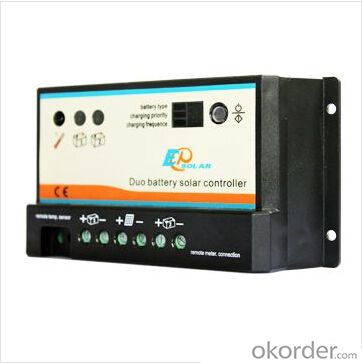
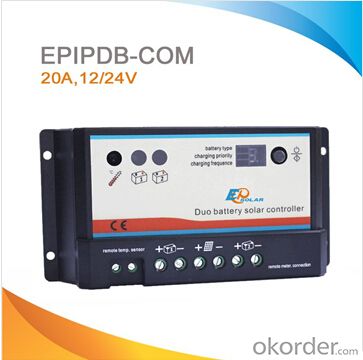
FAQ:
Q1. What is the voltage?
A1. Our 45/60A solar charge controller is 12/24/36/48V auto work.
Q2. What is the difference between MPPT&PWM?
A2. MPPT has higher efficiency, it can track the max power point and won't waste energy.
Q3. What is the efficiency of the MPPT controller?
A3. MPPT>99%, peak conversion efficiency>98%.
Q4. What is the waranty of product?
A4. 12 months.
- Q: How do I determine the size of a solar controller for my system?
- To determine the size of a solar controller for your system, you need to consider the maximum current and voltage of your solar panels. The solar controller should be capable of handling the current and voltage outputs of your panels. Additionally, you should also consider the maximum load or power consumption of your system to ensure the controller can handle the required capacity.
- Q: Can a solar controller be used with solar water heaters?
- Yes, a solar controller can be used with solar water heaters. A solar controller is an essential component that regulates the operation of solar systems, including solar water heaters. It helps optimize the efficiency of the system by controlling the circulation of water, temperature, and other parameters.
- Q: Can a solar controller be used with a solar-powered RV?
- Yes, a solar controller can be used with a solar-powered RV. In fact, it is highly recommended to use a solar controller to regulate the charging and discharging of the RV's batteries. The solar controller helps optimize the charging process, prevents overcharging, and extends the lifespan of the batteries.
- Q: Can a solar controller be used with a solar-powered educational institution?
- Yes, a solar controller can be used with a solar-powered educational institution. A solar controller regulates and monitors the flow of electricity generated by solar panels, ensuring efficient charging and protection of batteries. It is an essential component for managing and optimizing the solar power system in an educational institution, facilitating reliable and sustainable energy supply.
- Q: How does a solar controller handle variations in solar panel current?
- A solar controller handles variations in solar panel current by regulating and optimizing the charge flow between the solar panels and the battery. It continuously monitors the current output from the panels and adjusts the charging parameters to match the battery's requirements. This ensures that the battery receives the appropriate amount of charge and prevents overcharging or undercharging, thereby maximizing the efficiency and lifespan of the battery.
- Q: Can a solar controller be used with a solar-powered marine system?
- Yes, a solar controller can be used with a solar-powered marine system. A solar controller regulates the charging and discharging of batteries connected to a solar panel system, ensuring optimal performance and preventing overcharging. This functionality is essential for maintaining and managing the power supply in a solar-powered marine system, making a solar controller a valuable component in such applications.
- Q: How does a solar controller handle the protection against reverse polarity?
- A solar controller handles protection against reverse polarity by including diodes or relays in its circuitry. These components ensure that the flow of current is directed correctly and prevent any potential damage to the solar panels or other connected devices.
- Q: Can a solar controller be used with a solar-powered greenhouse?
- Yes, a solar controller can be used with a solar-powered greenhouse. A solar controller helps regulate and optimize the charging and discharging of batteries in a solar system. In a solar-powered greenhouse, the controller can manage the flow of energy from the solar panels to the batteries, ensuring optimal power usage and storage. It can also monitor and control various greenhouse functions such as temperature, humidity, and ventilation, contributing to the efficient operation of the greenhouse.
- Q: I installed the force Norit, solar hot water controller on a regular, set, Sheung Shui, three keys, how to set the automatic Sheung Shui!
- Press and hold the warm water temperature button for 3 seconds, hear the "drop" after the sound, the display temperature of the two digital and "regular heating" indicator light began to flash, press the heating water temperature key to set the time heating time The Set the time in Beijing plus the set number of hours is the timing of the heating time, such as set at 10 am, regular heating at 4 pm every day, then set the number of hours 06 (range 00-23), wait 5 seconds to automatically save the exit "regular heating" light is always bright, the heating effect of the deadlock, after 4 pm every day will automatically heat up regularly. Cancel the regular heating, according to "heating water temperature" between 3 seconds, hear the "drop" after the "regular heating" indicator off, the timing heating function is canceled.
- Q: What is the maximum load power consumption in standby mode of a solar controller?
- The maximum load power consumption in standby mode of a solar controller can vary depending on the specific model and manufacturer. However, it is typically quite low, ranging from a few milliwatts to a few watts. This low power consumption is essential to minimize energy wastage and ensure the efficient operation of the solar controller. By keeping the load power consumption low in standby mode, the solar controller can conserve energy and extend the overall lifespan of the system.
Send your message to us
Solar Controllers for Sale - Duo Battery Charge Controller Solar for Caravan, Motorhome, Boat and Golf Cart, 20A, 12/24V, EPIPDB-COM
- Loading Port:
- Tianjin
- Payment Terms:
- TT or LC
- Min Order Qty:
- 30 pc
- Supply Capability:
- 1000 pc/month
OKorder Service Pledge
OKorder Financial Service
Similar products
Hot products
Hot Searches
Related keywords
